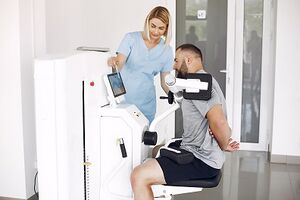Advanced Physiotherapy Practice: Difference between revisions
No edit summary |
(Image in intro) |
||
| Line 3: | Line 3: | ||
'''Top Contributors''' - {{Special:Contributors/{{FULLPAGENAME}}}} | '''Top Contributors''' - {{Special:Contributors/{{FULLPAGENAME}}}} | ||
</div> | </div> | ||
== Introduction == | == Introduction == | ||
[[File:Patient-doing-exercise-using-quipment-with-therapist.jpg|alt=Patient doing exercise using equipment with therapist|right|frameless]] | |||
Advanced Physiotherapy Practice (APP) refers to a higher level of physiotherapy practice, with specific competencies, responsibilities, functions, activities and standards. | Advanced Physiotherapy Practice (APP) refers to a higher level of physiotherapy practice, with specific competencies, responsibilities, functions, activities and standards. | ||
Advanced Physiotherapy Practitionners (APPs) are | Advanced Physiotherapy Practitionners (APPs) are referred to in some cases as Extended Scope Practitioners (ESPs). <ref>Tawiah AK, Desmeules F, Wieler M, Finucane L, Lewis J, Woodhouse LJ, et al. [https://pubmed.ncbi.nlm.nih.gov/34794584/ Advanced practice in physiotherapy: a global survey.] Physiotherapy. 2021;113:168–76.</ref><ref>Vedanayagam M, Buzak M, Reid D, Saywell N. [https://pubmed.ncbi.nlm.nih.gov/34607076/ Advanced practice physiotherapists are effective in the management of musculoskeletal disorders: a systematic review of systematic reviews.] Physiotherapy. 2021.</ref> | ||
One of the main drivers behind APP is the steady rise of healthcare utilisation and demand over the years, <ref>Garson A Jr, Levin SA. [https://pubmed.ncbi.nlm.nih.gov/21765711/ Ten 10-year trends for the future of healthcare: implications for academic health centers.] Ochsner J. 2001;3:10–5.</ref> which is expected to increase even further over the next decades. This places an additional burden to doctors, whose workload not only increases considerably but also witness a decline in the number of their colleagues. | One of the main drivers behind APP is the steady rise of healthcare utilisation and demand over the years, <ref>Garson A Jr, Levin SA. [https://pubmed.ncbi.nlm.nih.gov/21765711/ Ten 10-year trends for the future of healthcare: implications for academic health centers.] Ochsner J. 2001;3:10–5.</ref> which is expected to increase even further over the next decades. This places an additional burden to doctors, whose workload not only increases considerably but also witness a decline in the number of their colleagues. | ||
Revision as of 10:24, 23 May 2023
Original Editor - Angeliki Chorti
Top Contributors - Angeliki Chorti and Cindy John-Chu
Introduction[edit | edit source]
Advanced Physiotherapy Practice (APP) refers to a higher level of physiotherapy practice, with specific competencies, responsibilities, functions, activities and standards.
Advanced Physiotherapy Practitionners (APPs) are referred to in some cases as Extended Scope Practitioners (ESPs). [1][2]
One of the main drivers behind APP is the steady rise of healthcare utilisation and demand over the years, [3] which is expected to increase even further over the next decades. This places an additional burden to doctors, whose workload not only increases considerably but also witness a decline in the number of their colleagues.
Despite the potential for increased deployment and value of APP, APP is not yet widely accepted in some countries. [4] Barriers in the implementation of APP may involve different values between doctors and APPs and reluctance to hand over control of elements of patient care to APPs. In addition, APPs do not appear to influence the implementation, because of their strong dependence on GPs. [4]
Resources[edit | edit source]
WP Position Paper on Advanced Clinical Practice in Physiotherapy in the European Region
References[edit | edit source]
- ↑ Tawiah AK, Desmeules F, Wieler M, Finucane L, Lewis J, Woodhouse LJ, et al. Advanced practice in physiotherapy: a global survey. Physiotherapy. 2021;113:168–76.
- ↑ Vedanayagam M, Buzak M, Reid D, Saywell N. Advanced practice physiotherapists are effective in the management of musculoskeletal disorders: a systematic review of systematic reviews. Physiotherapy. 2021.
- ↑ Garson A Jr, Levin SA. Ten 10-year trends for the future of healthcare: implications for academic health centers. Ochsner J. 2001;3:10–5.
- ↑ 4.0 4.1 Pellekooren S, Donker M, Reijnders E, Boutalab L, Ostelo R, van Tulder M, Pool-Goudzwaard A. The introduction of advanced practice physiotherapy within Dutch primary care is a quest for possibilities, added value, and mutual trust: a qualitative study amongst advanced practice physiotherapists and general practitioners. BMC Health Services Research 2022 April 21; 22:529.







